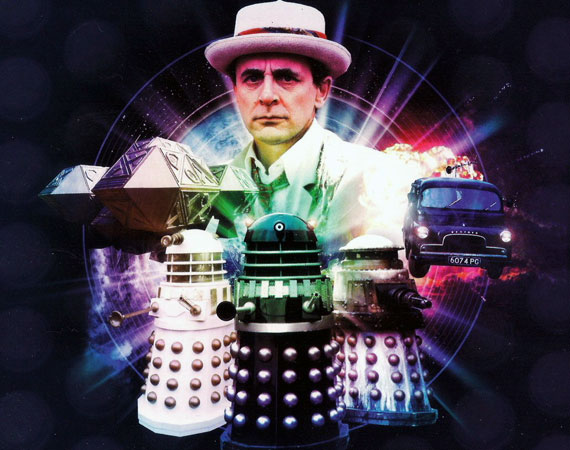Defining the Doctor: Remembrance of the Daleks
Patrick Kavanagh-Sproull continues his series looking at one key story from each Doctor, this time with Sylvester McCoy.

Certain episodes of Doctor Who impact on the show’s mythos and biology more than others. To pluck a couple of examples from the air, take The Gunfighters and The Three Doctors, two completely contrasting stories, two completely contrasting Doctors and nothing in common. Yet both stories had an impact on the show, admittedly one was mightier than the other. The Gunfighters was Doctor Who’s first trip to the Wild West (the next time it went down that path was only last year in A Town Called Mercy), and The Three Doctors brought the first trio of Time Lords together. Each involved new concepts for the show, and were different in their own ways. The story I’m looking at here: Remembrance of the Daleks was something entirely different. It was a regular Seventh Doctor story but one that has etched itself deep into the show’s biology.
The Daleks needed a reboot. Not an infelicitous Victory of the Daleks makeover, but a deep revamp. Remembrance of the Daleks was like Nightmare in Silver (bear with me a moment), the Daleks had had some pretty weak stories at that time (Revelation of the Daleks was poor but not entirely without charm) and producer John Nathan-Turner wanted to open the twenty-fifth anniversary season with something special and so commissioned neophyte writer Ben Aaronovitch to write a Dalek story. Aaronovitch was a sort of Tom MacRae of his age, he was young and new to the business and tasked with something big and epic. Aaronovitch produced two successful stories in his time on Doctor Who (MacRae has too, funnily enough; depending on your opinion of his Cybermen story) but Remembrance was undoubtedly more popular.
The Doctor and Ace materialize somewhere familiar to fans, Shoreditch where the whole institution began way back in An Unearthly Child. Within the first episode the pair are fighting Daleks in Totters Lane (something that a small cluster of us hope will recur in the 50th, and the fire for this could be fuelled further given the recent announcement that the Doctor’s legendary foes are returning in November), running around Coal Hill School and experiencing the first-ever hovering Dalek. Remembrance of the Daleks is a fan’s dream anniversary episode but it’s more than just a good way to celebrate twenty-five years of Doctor Who, it’s also a really good Dalek story, for the following reasons.
I think the idea of a Dalek civil war is one that has been completely untouched in the new series. The closest we’ve ever had is the crazed Daleks in the Asylum who the Dalek Parliament want destroyed, and even that’s a not very good example. Remembrance of the Daleks fleshed out the idea and gave us something really special: Daleks vs. Daleks.

In the classic series of Doctor Who, it was always the Daleks’ plot to kill the Doctor – never succeeding because he always foiled their schemes. Now Remembrance of the Daleks was really shocking, it pitted Daleks against Daleks, something viewers hadn’t seen before. The result was some slickly directed fight sequences and occasionally the Doctor and Ace would get caught in the crossfire. As well as showing the first Daleks against Daleks war, we also delved a little more into the Doctor’s backstory.
I’m sure many of you have heard of the Cartmel Masterplan, but for the uninitiated I’ll give you a brief summary. Script editor Andrew Cartmel and writers Ben Aaronovitch and Marc Platt wanted to shroud the Doctor and his origins in more smoke. They felt we knew too much about him and so tried to return him to being the enigma that he is today. The ‘masterplan’ itself sounds fascinating but it never made it to the screen after the show was pulled from the airwaves in the late 80s. Remembrance of the Daleks is, or was, peppered with references but a lot of the unsubtle lines (“[I’m] far more than just another Time Lord”) were slashed and left on the cutting room floor. There were hints, however, that the Doctor was present at the creation of the Hand of Omega, a stellar manipulator forged by Omega from The Three Doctors. I would have liked to have seen the Cartmel Masterplan in all its glory, but I fear that it could have turned nasty, like the half-human plot-strand in The TV Movie.
Remembrance of the Daleks is an out-and-out masterpiece, a sheer tour de force of Daleks, Time Lords and post-An Unearthly Child references. Sylvester McCoy performs magnificently, as ever, and Sophie Aldred is rather mellow (for Ace, that is, she’s still into her rocket launchers, just not to the usual extent) given how violent Ace normally was. The supporting characters are great; Simon Williams gives Group Captain Gilmore an air of the Brigadier without directly copying the late Nicholas Courtney’s style. Pamela Salem is infectious as the sassy Dr. Rachel Jenson, and Dursley McLinden makes us grow fond of his character, Sergeant Mike Smith before he is cruelly taken from us.
Remembrance of the Daleks isn’t Sylvester McCoy’s best story, which raises the question – why choose a defining story that isn’t the actor’s best? My justification is this, Remembrance is an exemplary Seventh Doctor story; it has dark undertones that ran through McCoy’s entire tenure, a heart, and humour. McCoy acts gamely, as he did in every story, that’s what was so good about him; he performed sublimely in Delta and the Bannermen – and that is a hard thing to do.








